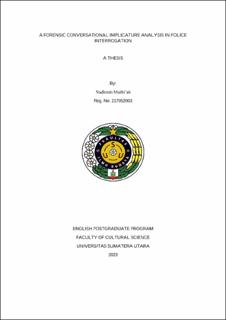| dc.description.abstract | The aims of this study are to identify the types of forensic conversational implicature, to describe the realization of forensic conversational implicature and to investigate the reasons of the realization of conversational implicature found in murder case interrogation happened in Sheboygan Falls, Wisconsin, U.S. Qualitative method with philosophical approach was used, as well as Forensic Discourse Analysis as analytical framework. Documentation study method was used to collect the data obtained from Explore with Us YouTube channel. In analyzing the data, deductive content analysis was applied. Utterances that indicated as implicature are the data taken from an interrogation video sourced from Explore with Us YouTube channel particularly murder case happened in U.S. The results show that two types of forensic conversational implicature are found in this study with particularized conversational implicature as the most dominant and generalized took the second place. The conversational implicature showed by identifying the suspect’s utterances with Cooperative Principles, which found the maxim of quality as the dominant, followed by maxim quantity, maxim of relevance, and lastly maxim of manner. The reasons behind the realization are under two themes namely gain trust and humanity. The reasons of the realization of obedience or violation the Cooperative Principle, include: (Violation the CP) 1). Desire to Conceal Information, 2). Fear of Legal Consequences, 3). Protecting Personal Interests, and 4). Lack of Trust in Law Enforcement. Meanwhile, the obedience of CP: 1). Fear of Legal Ramifications, 2). Perception of Fair Treatment, 3). Understanding of Potential Consequences, and 4). Perception of a Fair Process. | en_US |





